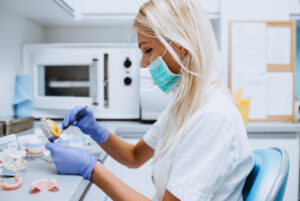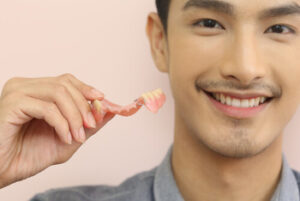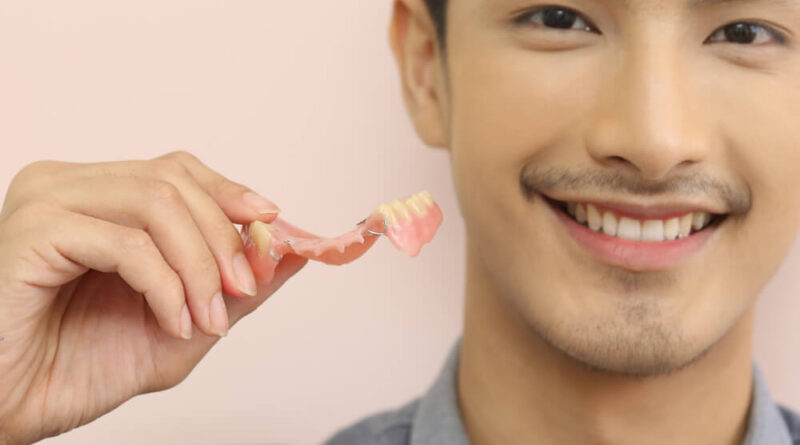Can You Eat with Partial Dentures? Here’s What You Need to Know
If you have missing teeth, you might consider partial dentures to restore your smile and ability to eat normally. One of the most common questions people ask is, “Can you eat with partial dentures?” The short answer is yes, you can, but it takes some getting used to.
This blog will cover everything you need to know about eating with partial dentures, from what to expect during the adjustment period to the foods that are best (and worst) for your new teeth. For a long‑term solution that feels more like natural teeth, you can also explore dental implants in Thornhill Park as a reliable option.
What Are Partial Dentures and How Do They Work?
Partial dentures are removable dental appliances designed to replace one or more missing teeth. They consist of artificial teeth attached to a gum-colored base, which is supported by your remaining natural teeth. Unlike complete dentures, which replace all teeth in the upper or lower jaw, partial dentures are a functional and aesthetic solution specifically for those who still have some of their natural teeth.
Your dentist or dental technician will custom-make your partials to ensure they fit securely in your mouth and look as natural as possible. They are usually held in place with metal clasps or precision attachments that clip onto adjacent teeth.
So, Can You Eat with Partial Dentures?
 Yes, you absolutely can eat with partial dentures, but it may take some time and patience. Eating with partial dentures isn’t the same as chewing with natural teeth, especially at first. Your mouth will need to adapt to the new appliance, and your chewing technique might need some adjustments.
Yes, you absolutely can eat with partial dentures, but it may take some time and patience. Eating with partial dentures isn’t the same as chewing with natural teeth, especially at first. Your mouth will need to adapt to the new appliance, and your chewing technique might need some adjustments.
This adjustment period varies for everyone. For some, it takes a few days. For others, it may take a few weeks to feel completely comfortable. The good news is that most people do get used to eating food with partial dentures and can enjoy most of their favorite foods again.
What to Expect During the Adjustment Period
When you first start wearing partial dentures, it’s normal for things to feel a bit awkward. You might experience:
- Sore spots on your gums
- Minor difficulty chewing or speaking
- A sensation that your dentures are loose or bulky
- An increase in saliva production
These issues typically fade over time as your mouth adjusts. If they persist, your dentist can help make small adjustments for a better fit.
Starting Off Right: Eat Soft Foods First
In the beginning, it’s best to eat soft foods that require minimal chewing. This allows your gums and jaw to adapt without placing too much pressure on your new dentures.
Some good soft food options include:
- Mashed potatoes
- Yogurt
- Cooked vegetables
- Scrambled eggs
- Smoothies
- Oatmeal
- Soft cheeses
Eating these foods can help reduce discomfort and prevent damage to your new partials.
Tips for Eating with Partial Dentures
Here are some helpful tips to make eating with partial dentures easier and more comfortable:
Take Small Bites
Cut food into small pieces before eating. This minimizes strain on your dentures and allows for more control while chewing.
Chew Slowly and Evenly
Try to chew slowly and use both sides of your mouth at the same time. This helps balance the pressure on your dentures and prevents shifting.
Avoid Hard and Sticky Foods
Foods that are hard or sticky can dislodge your dentures or cause damage to the artificial teeth. Try to avoid:
- Nuts
- Chewing gum
- Caramel
- Crunchy snacks
- Hard-crusted bread
These foods can not only make eating difficult but also trap food particles under the dentures, which may lead to irritation or infection.
Use Denture Adhesive If Needed
A small amount of denture adhesive can help secure your dentures and improve your confidence while eating. Ask your dentist if adhesive is appropriate for your situation.
Drink Plenty of Water
Staying hydrated can help with chewing and swallowing. It also helps prevent dry mouth, which is more common when wearing dentures.
Eating Specific Foods with Partial Dentures
Let’s break down how to handle different types of foods when wearing partial dentures:
Chewy Foods
Be cautious if you want to eat chewy foods like cooked meats or certain fruits. Cook the meat until it’s tender and slice it into thin strips. For fruits like apples or pears, consider cooking or softening them beforehand.
Sticky Foods
It’s best to steer clear of sticky foods entirely. They can stick to your dentures, pull them loose, or even damage the structure. Items like toffee, chewing gum, and certain candies should be avoided.
Crunchy and Hard Foods
Avoid hard foods that can damage your dentures or your remaining natural teeth. This includes popcorn, nuts, hard candies, and raw vegetables like carrots. Opt for cooked vegetables instead, which are softer and easier to manage.
Regaining Confidence at Mealtime
It’s normal to feel a little self-conscious when eating with partial dentures at first. But don’t worry. As you become more accustomed to your new dentures, eating will feel more natural, and your confidence will grow.
Focus on the positives: Partial dentures are not just a set of false teeth. They are a practical solution that can improve your chewing, restore your smile, and even support better oral health by preventing your remaining teeth from shifting.
Long-Term Care for Better Eating
Keeping your partial dentures clean and well-maintained is essential for a good eating experience. Here are a few daily habits to help:
- Remove and rinse dentures after meals to remove food particles

- Brush your dentures with a soft denture brush (not regular toothpaste)
- Soak them overnight in a denture cleaning solution
- Brush your natural teeth and gums twice a day
- Schedule regular dental checkups to ensure a proper fit
Taking care of your dentures means you’ll continue to enjoy a wide variety of foods without discomfort or complications.
When to Speak with Your Dentist
If you continue having trouble eating with your partial dentures even after the adjustment period, don’t hesitate to contact your dentist. Persistent pain, loose dentures, or trouble chewing may indicate that your appliance needs an adjustment. Your dental technician can also help improve the fit and comfort.
Enjoying Life Again with Partial Dentures
Eating with new partial dentures might feel different at first, but with the right approach, most people find they can enjoy nearly all the foods they love. From soft foods to more solid options, the key is to take things step by step.
Partial dentures offer both a functional and aesthetic solution to missing teeth, helping you chew more effectively, speak more clearly, and smile with confidence. With proper care and a bit of patience, eating food with partial dentures can become second nature.
So yes, you can eat with partial dentures; with time, you’ll likely forget you’re even wearing them.
References:
https://www.polident.com/en-us/partials/adjusting-to-partials/learning-to-eat-with-partial-dentures/
https://www.healthline.com/health/dental-and-oral-health/partial-denture
https://my.clevelandclinic.org/health/treatments/10900-dentures
https://www.dentalhealth.org/bridges-and-partial-dentures

